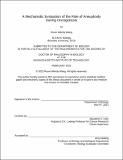A Mechanistic Evaluation of the Role of Aneuploidy During Oncogenesis
Author(s)
Wang, Ruoxi Wendy
DownloadThesis PDF (5.312Mb)
Advisor
Lees, Jaqueline A.
Terms of use
Metadata
Show full item recordAbstract
Accurate chromosome segregation during cell division is critical to cellular fitness and survival. Errors during the segregation process often lead to aneuploidy, a state where cells harbor whole chromosome gains or losses. In untransformed cells, aneuploidy is highly detrimental to cell physiology, where it elicits multiple stress responses and impairs cell proliferation. Paradoxically, aneuploidy is also a hallmark of cancer and high degrees of aneuploidy in tumors are often associated with aggressive disease progression and poor prognosis. It is thus important to study the molecular mechanisms of aneuploidy during oncogenesis in order to reconcile the different effects of karyotype alteration in untransformed and cancer cells. In this thesis, we first investigate the mechanism by which untransformed cells harboring highly complex karyotypes trigger a natural killer cell-mediated immune response. We find that activation of the NF-κB pathway is responsible for such aneuploidy-associated immune clearance in vitro. We also provide evidence that potential mutations may counteract the NF-κB-mediated cytotoxicity during the cell transformation process. Second, we study the role of frequent chromosome 8 (chr8) gain in Ewing sarcoma, a pediatric bone and soft tissue tumor that is mainly driven by the EWS-FLI1 fusion oncogene. Here, we specifically investigate the molecular mechanism of one chr8 gain-driver gene, RAD21, in mitigating EWS-FLI1-induced replication stress and promoting oncogenesis. We find that the overexpression of RAD21 facilitates the resolution of transcription-replication conflicts in EWS-FLI1 expressing cells. This is achieved partially by RAD21’s recruitment to the stalled replication forks, where RAD21 interacts with DNA repair initiation proteins to promote efficient damage repair and stalled replication fork restart. In summary, our work reveals how the role of karyotype alterations during oncogenesis can be highly context-dependent. Whereas random aneuploidies bring fitness penalty in normal untransformed cells, a tumor-specific aneuploidy can provide benefits for cellular fitness and lead to positive selection of specific karyotypes. Outcomes from our study can implicate the potential therapeutic targets for treatment of aneuploid cancer.
Date issued
2022-02Department
Massachusetts Institute of Technology. Department of BiologyPublisher
Massachusetts Institute of Technology